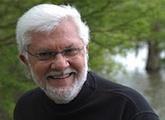
Richard Chachere has lived in Lafayette, Louisiana for the last 32 years practicing Jungian therapy, after founding The Acadiana Friends of Jung in 1978, and after attending the California School of Professional Psychology in San Diego and working in analysis with Jack Sanford and getting to know the Southern California Jungian community, especailly the work of Edward Edinger and Diane Cordic. He has also worked with Dr. Theo Abt in Zurich.
Richard has written 2 books: American Beauty, A jungian Commentary; as well as Legends of the Fall;, a Jungian Commentary. His “Tears for Louisiana” is an outpouring after the Oil Spill near his home in Lafayette, and summer home, Cypremort Point, La., where he has been working on the life of Laurens Van Der Post for the past 5 years, witnessing the ravages of Hurricanes Katrina, as well as Ike and Gustav; and now BP’s massive Oil Spill! Which has also brought to life his boy’s story, The Fisher Boy, not yet printed, along with Gone With The Wind, A Jungian Commentary.
Richard reports he is now 70 years old.
A psychology podcast by David Van Nuys, Ph.D.
Podcast: Play in new window | Download
Subscribe: Apple Podcasts | RSS
Congratulations on another enlightening podcast episode 241 with Richard Chachere speaking on “Jung in the Louisana Gulf”.
I think that the idea of humankind’s collective shadow being manifest in the destructiveness of nature demonstrated in the BP oil spill was mythopoetically and beautifully expressed.
Just as such global “summonses” as HIV and climate change mean confronting such archetypal “shadow” qualities as metaphysical materialism and consumerism in the developed world.
I just wanted to suggest an idea for a future podcast.This might cover the epistemological “psychophysical problem” and the nature of the mind/brain/consciousness interfaces.
Although discussed in my “Mind and Matter” paper in section 4, this issue deserves, I believe, a more comprehensive treatment than was possible in our interview.
I have mentioned Professor Harald Atmanspacher to you. Another possible guest might be neuroscientist Professor Karl Pribram at Georgetown University.
He published a very provocative paper “Consciousness re-assessed” in the “Mind and Matter” Journal, 2004, 2(1) pp 7-35.
I do hope that these ideas are useful to you and thanks again for our interview.
On the subject of Shadow and national psyche, I can\’t help but notice something in this oil spill. Until very recently, most of the world – America included – has referred to the company as BP, and most still do since they changed their name however many years back to give off a more international persona.
However, since this spill Americans have been very quick to say “British Petroleum” instead. I can’t help but feel that this is some way of Americans distancing themselves from this problem by having a clear-cut villain to project their anger onto. It can mean that it’s no longer “us” (to Americans), but “them”, and indeed, there’s been a great deal of anti-British sentiment since the incident.
It seems like an awfully convenient way of dealing with the problem emotionally. If we go back to the Shadow, the US is infamous worldwide as ruthless oil consumers and drillers, with the need for oil often being seen as a reason for even invading countries. Now the Shadow has come to the surface almost literally (a big black thing has covered US shores!), and one way of dealing with that would be to find an external villain to shift the blame to, such as BRITISH Petroleum.
But exactly how British can a company like BP really be in today\’s multi-national corporate world? If people were honest with themselves, there’s really little to no difference between them and an outwardly American company.
So next time you find yourself specifically saying “British Petroleum” instead of BP, ask yourself: is it to shift blame onto an external tormentor, or is it a way of hiding from the fact that we’re supporting a corrupt system that rapes the ground we walk on? Every time you fill up that car, or open that bag of chips, or use a plastic supermarket bag, or…… (you get the picture)